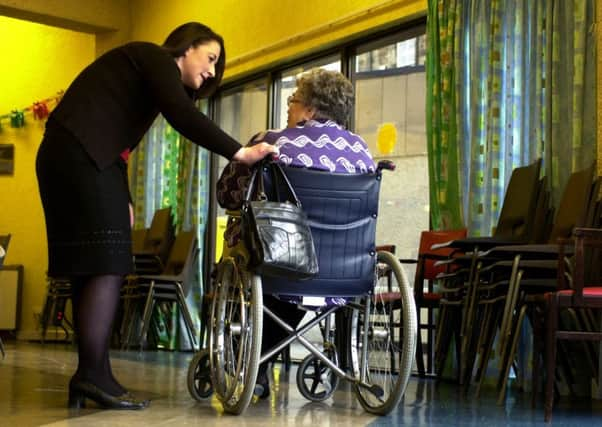Neil McNicholas: Spare the elderly these unfair taxes


MY parents are currently in a residential care home having both developed Alzheimer’s disease and having reached the stage where they were unable to remain in their own home.
Fortunately they had made financial provision for their old age but, unfortunately, this means they therefore do not qualify for any state assisted funding – other than a payment toward the mental health nursing element of the care my father requires.
Advertisement
Hide AdAdvertisement
Hide AdWhilst I would accept that if someone has sufficient savings they should contribute to the cost of their care, I also think that such a contribution should be calculated on a sliding scale because it seems highly unjust that people like my parents – who not only saved for their old age but also paid their National Insurance stamps when they were working – should have to pay 100 per cent of their care costs when others who perhaps made no such provision have their costs paid for by the state.
And, of course, if the need eventually arises, they (or at least I on their behalf) will be required to sell their house – because they still have one – in order to continue paying.
Everyone you speak to, and especially professionals within the care system, says the policy is unfair in that regard, and yet somewhat amazingly nothing is being done to change it in order to make it more equitable and fair.
My parents would be outraged if they knew how much of their hard-earned money it is costing for the care they now require (jointly £5,000 a month) – thankfully (in that regard) they no longer have any idea where they are or why.
Advertisement
Hide AdAdvertisement
Hide AdIt’s me who is outraged, not only over the injustice explained, but also as a result of the latest council tax bill received from Redcar & Cleveland Council.
I can marginally accept the need for everyone in the community to contribute to the cost of providing police and emergency services, but somewhere in the back of my mind a question arises as to whether there should be some sort of cut-off point at which those, like my parents, who are no longer an active part of that community should no longer have to pay toward those costs.
They are already paying to be part of the residential community where they now have to live.
Imagine my reaction, therefore, when I noticed the inclusion of new charge on the council tax bill: £27.45 for “adult social care”.
Advertisement
Hide AdAdvertisement
Hide AdI immediately fired off an email to the council pointing out that my parents were already paying for their social care and therefore why are they being charged even more to pay for other people’s social care? The response was that everyone has to contribute – but I beg to differ.
I repeat: My parents are already paying 100 per cent of their own social care costs because they have the means to do so, and now the local council is charging them even more to help to pay for the social care of everyone else. You couldn’t make it up.
The sooner I can sell their house the better, because that is clearly the anchor that is keeping them attached to this grossly unfair local tax system.
But it should be as clear as day to anyone with half an ounce of common sense that my parents are no longer actively contributing members of the local community.
Advertisement
Hide AdAdvertisement
Hide AdTheir world is purely what is going on inside their minds on a minute-to-minute (not even a day-to-day) basis.
That’s what Alzheimer’s has done to them. It’s bad enough that the state requires them to spend all their own money on the care they need, without the local council wanting its pound of flesh from two vulnerable adults who neither know they are being taxed nor have any voting rights any more to determine who should be levying them in that way.
That is surely why there should be a cut-off point beyond which no such demands are made of people in my parents’ situation.
The system required a professional assessment to determine their mental capacity before I was granted the legal right to manage their affairs.
Advertisement
Hide AdAdvertisement
Hide AdThe system also required a professional assessment, overseen by the courts, to grant the care home the right to confine them behind locked doors because that too was necessary; but no one seemingly feels it is also necessary to determine that they should no longer be asked to bankroll community services in a community of which they are effectively no longer a part.
Father Neil McNicholas is a parish priest in Yarm.